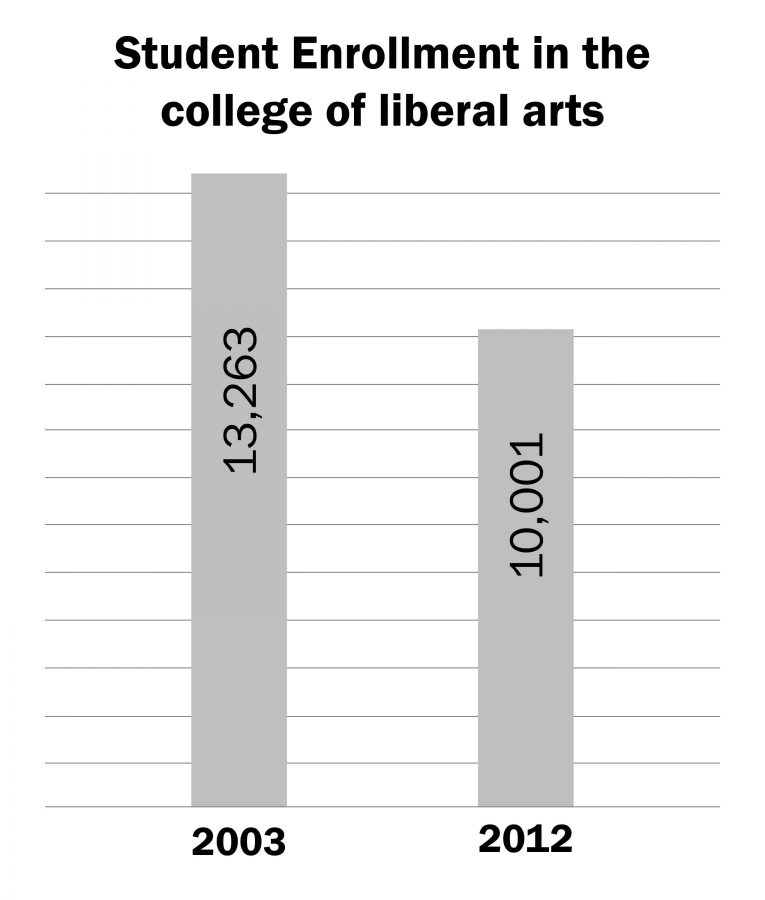Longhorn fans reveled in hope leading up to last Saturday’s game against Ole Miss. With a new defensive coordinator, we were optimistic for a win. Halfway through the third quarter, though, many fans had left. Another loss was imminent.
I know very little about football, but it doesn’t take an expert to know that the status quo is not effective, and the obvious solution is a new approach. But football isn’t the only defense lagging on our campus. The scenario transcends the seats of DKR and finds itself on the intellectual playing field as well.
As the economy declined over the last few years, many people started discrediting the value of the humanities in favor of vocational degrees, which often carry job security. In response to this shift, various scholars, students and others have come to the defense of the liberal arts. Op-eds frequently emerge in the pages of the New York Times and New Republic. The lengthy articles hinge on the same fundamental premises – the study of the humanities teaches us how to think critically and view the world through a broad and diverse lens, and, most applicable to the professional world, it teaches us how to write clearly and cogently. That last point was recently made by professor Verlyn Klinenborg, who wrote in a New York Times op-ed, “Writing well isn’t merely a utilitarian skill. It’s about developing a rational grace and energy in your conversation in the world around you.”
On the more emotional value of liberal arts, New Yorker staff writer Adam Gopnik recently wrote that “[The humanities] help us enjoy life and endure it better. ”
Both statements are poignant. Unfortunately, both statements are about 1,000 words into their respective articles. Who reads them? I do. My liberal arts peers do. The eloquent and enlightened words reaffirm our belief in our education and give us hope for our professional future. Meanwhile, our business and engineering peers are busy gaining educations that carry job security. Bottom line? The current approach to defending the liberal arts succeeds in convincing everybody but the people it targets – the non-liberal arts folk.
But why do we care what others think? Faith in our own majors is enough to carry us through the current burden of a broad education, right? Wrong.
As liberal arts students, we have a tendency to isolate ourselves and contemplate the difficult questions we face on a daily basis. The problem with that trend is that we regularly encounter the engineers and the business people. In fact, in many situations, they’re our potential employers. Concise and effective communication of the value of the liberal arts is key, especially considering the fast-paced society in which we live.
To emphasize this point even more, there are increasingly more graduates in technical fields and less in the liberal arts. New York Times columnist David Brooks recently wrote that the number of humanities degrees awarded across the nation has dropped from 14 percent to a mere seven percent in the last half-century.
A similar trend is taking place at UT-Austin. Enrollment numbers in the College of Liberal Arts have dropped from over 13,000 in 2003 to right at 10,000 in 2012. What used to be the largest college on our campus is now in second behind the College of Natural Sciences.
There are many well-articulated arguments supporting the study of the humanities and social sciences. Unfortunately, these advocates often lack brevity, which narrows their audience to liberal arts majors. This approach is not working. Across the nation, there is an increased emphasis on priority STEM fields, and from personal experience, I know many students in the College of Liberal Arts continually have to defend their majors to others.
One solution is to personalize the arguments. The critical thinking point is overstated and dry. For me, a kid from a small town in East Texas, studying the humanities has opened the door to a world I didn’t know existed, and it has radically changed my life for the better.
Maybe the personal touch works, maybe it doesn’t, but something has to change.
Wilson is a Plan II and history senior from Canton.





















